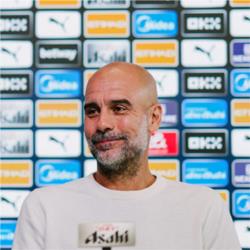
Pep Guardiola has rarely looked unsettled, but even he admits that managing Manchester City’s squad right now is giving him a “problem” he doesn’t mind having. With almost every player fit and ready, competition for places is as fierce as it has ever been at the Etihad. The manager’s so-called problem is simple: he has too many world-class players in form at the same time.
For a team chasing success across multiple competitions, that kind of depth is both a blessing and a balancing act. Guardiola has been here before. He has managed squads stacked with talent at Barcelona and Bayern Munich, but City’s current group might be his most complete yet. Every line has players who can start without dropping the standard. That makes team selection a headache, but it also gives City their trademark consistency through long, demanding seasons.
The latest international break came at the right time for City. A short pause after a run of tense fixtures gave players like Jack Grealish and Kevin De Bruyne a moment to recharge. Now, with fixtures against top Premier League sides on the horizon, Guardiola can turn to any number of combinations in midfield and attack without worrying about a dip in rhythm.
When you look at how the public sees City’s dominance, the odds say it all. On many of the best betting sites, Manchester City remain clear favourites for both the Premier League and Champions League. Their odds reflect more than just form; they show how bookmakers rate City’s control, precision, and ability to win under pressure. It’s hard to find a single competitor close to them in outright markets, which says plenty about how consistent this side continues to be, even as rivals strengthen year after year.
Guardiola’s current challenge is to keep every player engaged. Stars who are used to being automatic starters, such as Phil Foden or Bernardo Silva, now find themselves part of a larger rotation that includes younger options like Oscar Bobb and Rico Lewis. The hunger of those coming through the ranks keeps the veterans sharp, and Guardiola knows better than anyone that maintaining that balance is key to another strong campaign.
What stands out most is how City’s identity remains unchanged despite frequent changes in personnel. The tactical structure stays the same, and yet every player has his own interpretation of it. Julian Álvarez’s tireless pressing contrasts beautifully with Erling Haaland’s directness, while Rodri’s calm presence makes transitions seamless. This cohesion doesn’t happen by chance, it’s the result of years of drilling and trust between manager and players.
Guardiola’s “problem” also points to how City’s recruitment has matured. Instead of chasing stars for the sake of it, they have built a squad where each signing fits the system perfectly. Even when a big name leaves, the team’s rhythm doesn’t falter. Riyad Mahrez’s exit, for example, opened the door for younger players without weakening the right flank. It’s that kind of planning that keeps City one step ahead of their rivals.
In past seasons, Guardiola’s main concern has been burnout. After deep runs in the Premier League, FA Cup, and Europe, fatigue can creep in. But with so many options, this season may be different. He can rotate with confidence, resting key figures like Rodri or De Bruyne without fearing a drop in quality. The result is a squad that feels fresher during the toughest stretches of the campaign.
There’s also the matter of motivation. After winning everything last season, keeping that hunger alive is no small task. Guardiola thrives on finding new challenges within success, often tweaking tactics just to keep his players thinking. He’s been open about how maintaining focus after a treble-winning year is harder than chasing one. That’s where his man-management shines, he finds ways to turn comfort into competition.
Supporters have grown used to the rhythm of dominance, but even they can sense the excitement of this phase. The Premier League is more unpredictable than it looks on paper, and Guardiola knows it. Arsenal, Liverpool, and Tottenham are all pressing for momentum, each with squads capable of frustrating City on their day. What separates Guardiola’s men is not just quality but how they handle those rare setbacks. When City drop points, they rarely spiral. They respond immediately, and that rhythm keeps them ahead of the curve.
The upcoming winter period will reveal much. December’s fixture list, traditionally brutal for every title contender, will demand careful management. Guardiola’s rotation policy will be tested, and his decision-making scrutinised. But this is exactly the kind of pressure he enjoys. For him, football’s appeal lies in problem-solving, and right now, the puzzle in front of him might be the most enjoyable of his career.
City’s depth also shapes how opponents prepare. Teams can’t focus on shutting down a single player anymore. Stop Haaland, and Foden steps up, and Mark Foden, and Álvarez slips through. Guardiola’s City isn’t built around one star; it’s built on constant movement and shared responsibility. That’s what keeps them unpredictable.
What Guardiola calls a “problem” is in truth a rare luxury. Few managers ever reach a point where the difficulty lies in choosing which elite player to rest. For Manchester City, it signals stability, ambition, and a culture of excellence that refuses to fade. With each passing season, the challenge grows, yet so does the team’s ability to meet it.
City’s dominance might make the league seem predictable at times, but beneath the surface, Guardiola is juggling far more than most realise. His version of control is never rigid; it’s adaptable, reactive, and alive. If there’s a challenge to relish, this is it, the task of keeping the world’s most complete football squad hungry for more.